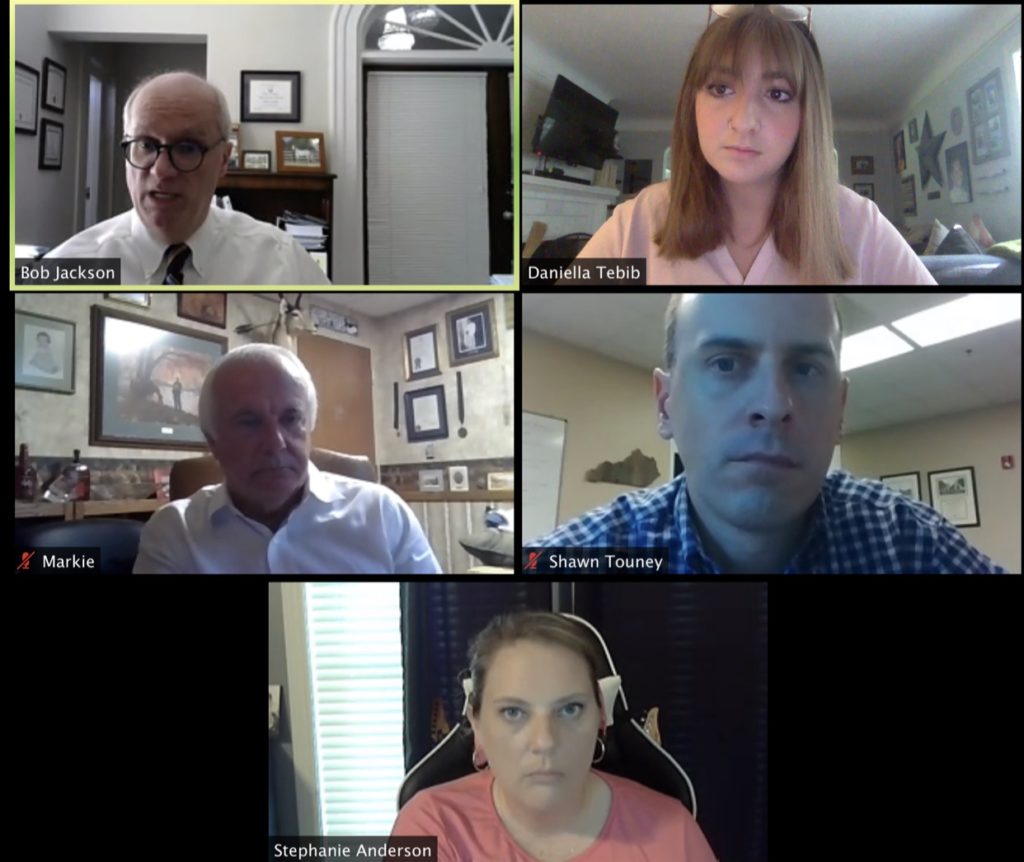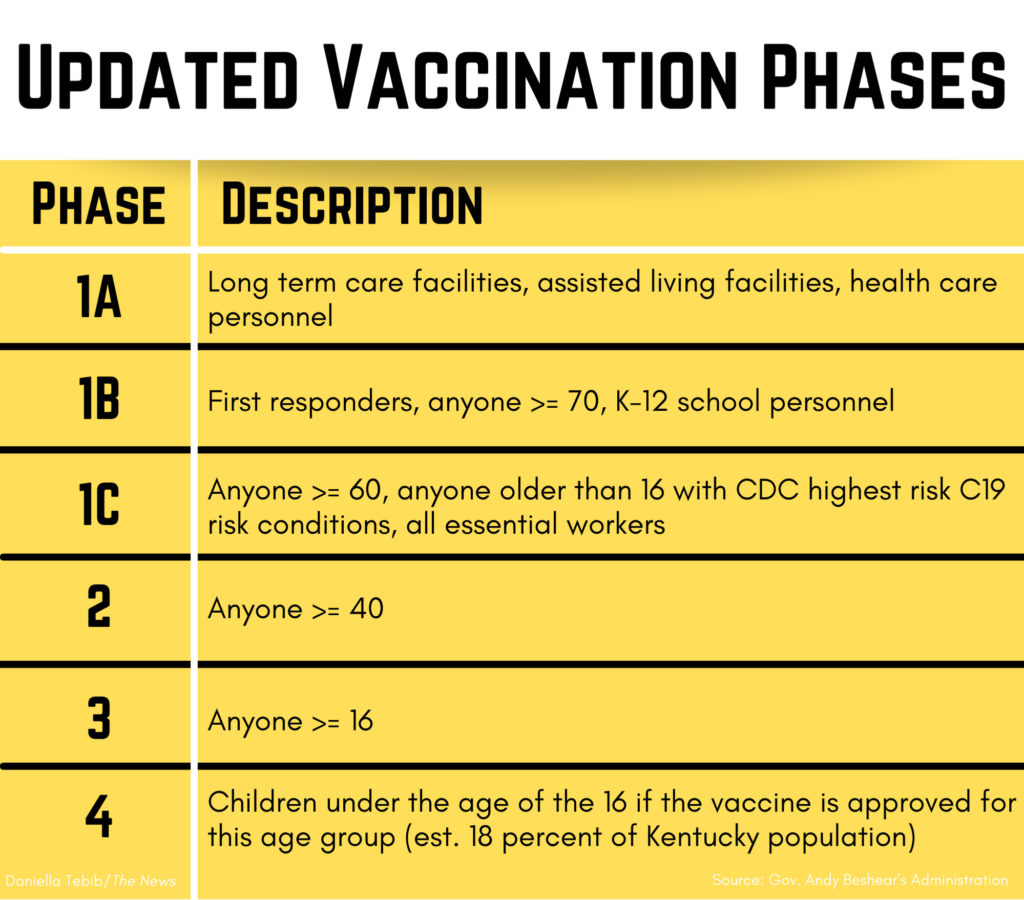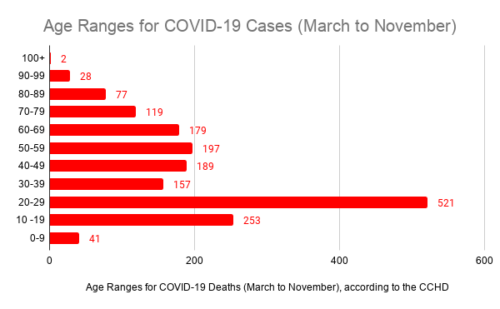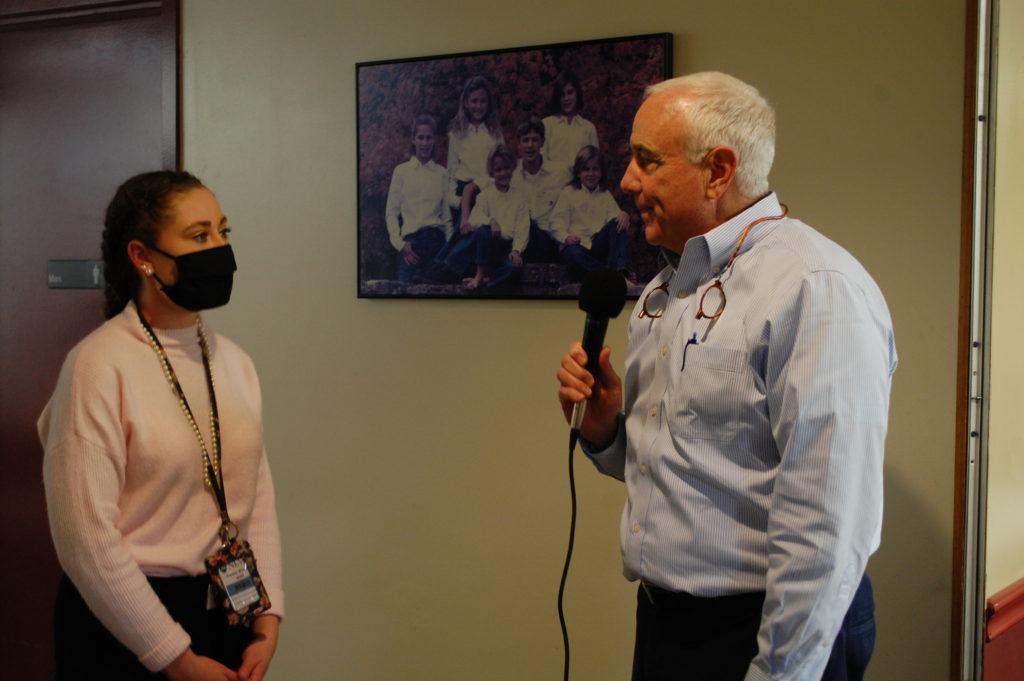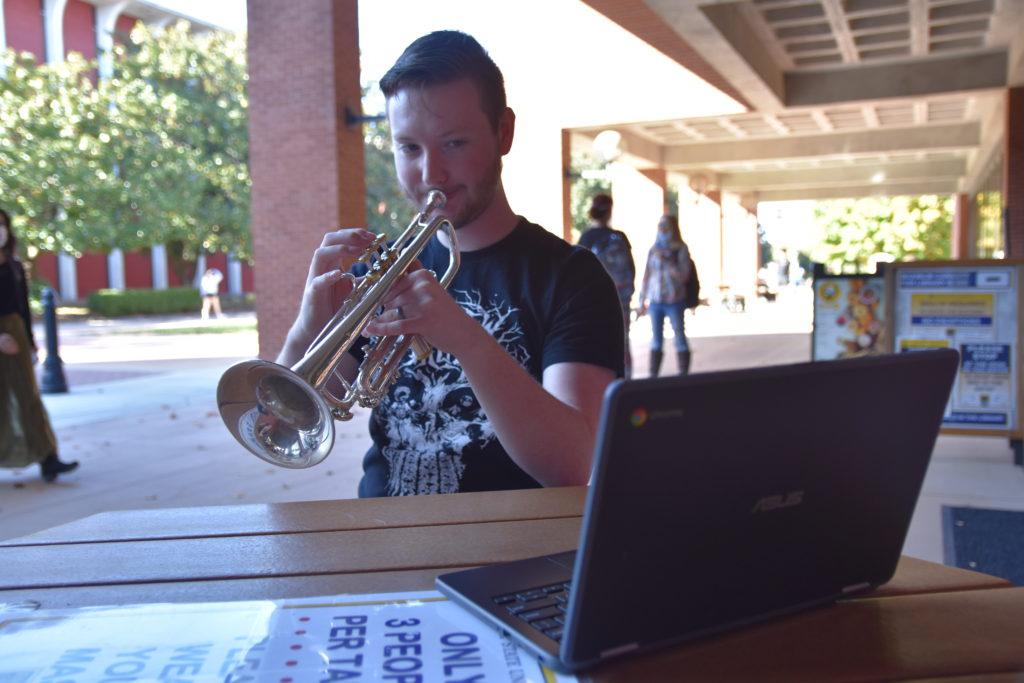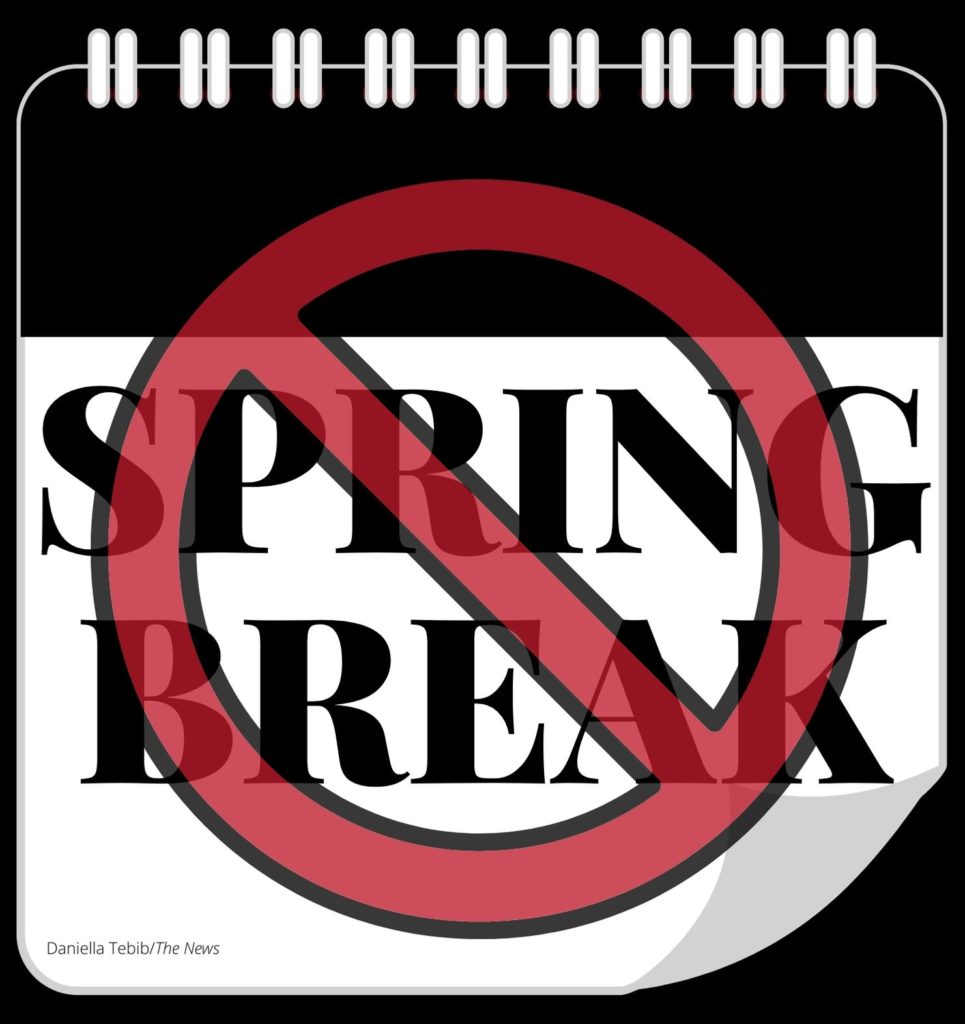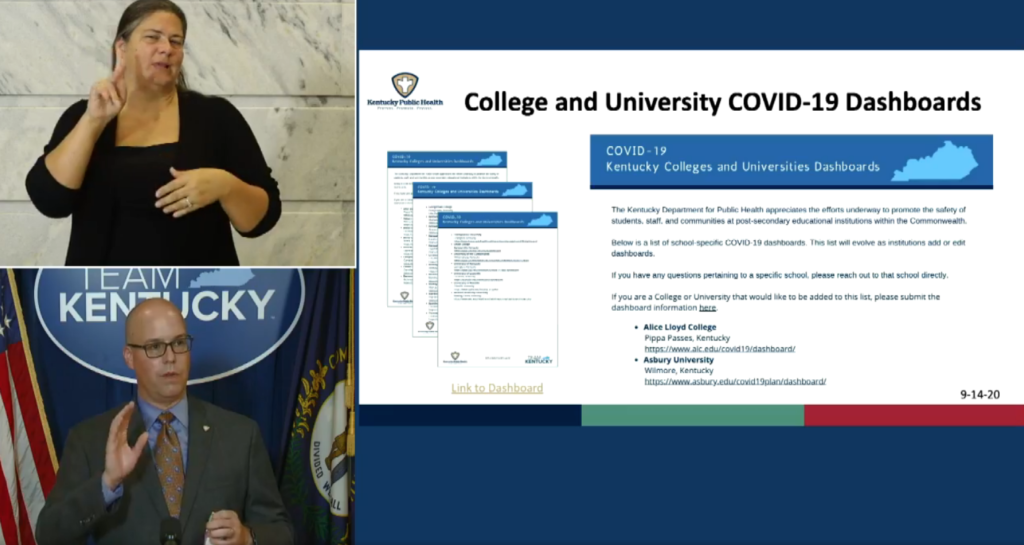Daniella Tebib
News Editor
The News sat down with President Bob Jackson, Chief Medical Officer Bob Hughes and Director of Communication Shawn Touney on Wednesday, Aug. 5 to discuss the pressing questions the Murray State community has about the return to campus.
Before returning to campus, students, faculty and staff are required to fill out a questionnaire stating where they have traveled to and where they are coming from. The University has a committee dedicated to reviewing the questionnaires and privately requesting specific individuals to get a COVID-19 test. However, the University is not asking any individual to quarantine upon arrival.
A face mask/covering policy has also been added to the student handbook over the summer. The student handbook currently has two clauses regarding face masks/coverings under the Housing Regulations section:
“HR 1: Conduct Endangering Personal Safety and Welfare – Any conduct which endangers the safety and welfare of other individuals such as hazing, assault, battery, abuse or threat of abuse on University owned or controlled property or at University functions is prohibited. In addition, during the COVID-19 pandemic, it is a violation of this section to fail to comply with University rules and precautions designed to mitigate the spread of COVID-19 which may include, but are not limited to, requirements to wear face coverings and practice social distancing.
HR 1.5: COVID-19 – during the COVID-19 pandemic, it is a violation of this section to fail to comply with University rules and precautions designed to mitigate the spread of COVID19 which may include, but are not limited to, requirements to wear face coverings and practice social distancing.”
Jackson said administrators and faculty members collectively have the responsibility to promote and ensure those on campus are wearing masks. If a student refuses to wear a mask in class, faculty members are allowed to ask them to leave.
“We can eliminate 75 to 80 percent of this if everyone just does what they need to do and wear their masks,” Jackson said. “We live in a civilized society and there’s expectations that come with that. I don’t apologize for any of it and none of us blinked here in regards to requiring people to wear masks. Some colleges and universities have a lot of angst over that and I don’t know why. That’s very little to ask to protect your neighbor. I wear one to protect you, and you wear one to protect me.”
Jackson said 65 percent of Murray State’s courses have an in-person or hybrid component. Courses that will be completely via Zoom only total up to 10 percent of the courses available, and 16 percent of the courses are purely online, which is consistent with the amount of courses online in recent years. In accordance with previous policies and decisions, Jackson also said online fees will not be applied to Zoom or hybrid courses.
Zoom cameras are being installed in most classrooms for courses that will need them. Students will also be able to use “Zoom rooms” on campus to ensure students will have wifi to access their classes via Zoom.
Jackson said the University also has plans in place to accommodate students who feel uncomfortable with coming to campus if COVID-19 cases begin to rise in Calloway County. Students with concerns about attending in-person classes can do their courses in a Zoom or online format.
If a student wishes to change the format of their class delivery, they will need to contact their academic advisers to make arrangements.
As students and faculty return to classroom settings and in-person instruction, a cleaning protocol has been created for classrooms. The protocol requires classrooms to be cleaned either daily or multiple times throughout the day, as well as the rest of campus.
If a student or faculty member tests positive for COVID-19, and they have previously been in a classroom, Jackson said the room would be closed down for a period of time and not opened for 24 to 48 hours. However, Hughes said the classroom would not be the main concern, it would be the people who were in contact with the person who tested positive.
Jackson said in order to protect the privacy of students, faculty and staff, the University will not be disclosing positive COVID-19 cases on campus. If a student, faculty or staff member tests positive, the University will report the case to the Calloway County Health Department and allow them to handle the tracking of cases.
“We’re handling it per state and federal regulations, guidelines and the Racer Restart plan because we’re protecting our student’s healthcare information,” Jackson said. “We do not want to ostracize anyone, it’s inappropriate. Some other schools and universities may be, but for the benefit and good of our students, there’s really no value in that… We will have a very general statement in regards to protecting our students’ healthcare information if that question is asked by anyone in the public press as well.”
If someone on campus does test positive for COVID-19, Jackson said they will not remain on campus. Once someone has been tested and is awaiting his/her results, they will be quarantined until the University receives the results. If the person who tests positive lives on campus, they’ll be quarantined in a disclosed location, on campus and out of the population, for 14 days. If they live off campus, they will be required to quarantine at home for 14 days.
Hughes said contact tracing will be handled by the Calloway County Health Department.
“The number one goal is safety, but privacy is right up there with that,” Hughes said. “You’ve got the two marching hand in hand. The health department is notified immediately when there’s a positive test result that comes back. Then, through their contact tracing, they work backwards to all of the people that need to be notified who came in contact with that person.”
If someone is tested off campus and tests positive, the health department will contact the University. Once the health department notifies the University that a member of the campus community has tested positive, deep cleaning will occur and classrooms will close depending on the situation.
“We have strict protocols in regards to those types of things,” Jackson said. “As we approach the first day of classes, that will be firmed up and finalized even more from the provost to the deans to the chairs to the faculty members as well as across campus to administrators.”
Jackson reiterated the decisions students make while being on and off campus are just as important as wearing a mask and socially distancing.
“You can find a news story every day where some people get together and big outbreaks occur,” Jackson said. “I don’t want a few students ruining it for all of the students. We’re working hard and have for months… We’re working very hard with our faculty and staff and administrators to do everything we can to have a good semester, so you all have a responsibility. It’s a favor I’m asking of our students.”
Steven Stack, public health commissioner for Kentucky, echoed what Jackson said about taking important safety measures, in a new video targeting college students. You can watch the video here.
Jackson said he has been asked about the annual block party in Cambridge after seeing posts about it on social media and the circulation of the t-shirts created to promote the party. Jackson has spoken with the presidents of each sororities and fraternities on campus about it.
“I said ‘we’re not having a block party,’” Jackson said. “Actually, Governor Beshear said there’s no social gatherings with ten or more people. I don’t want them [students] to later say, ‘that old fuddy duddy said we can’t do that,’ but they will and that’s okay because it’s my job. I’m doing these things and we’re trying to send a message to protect our students, our faculty, our staff and our administration, so we can have as good a semester as we possibly can have.”
To help discourage students from attending the block party, the University will have a presence there.
“That’s just not using good judgement,” Jackson said. “I’ve talked to some of the leaders of those groups [sororities and fraternities] and I told them I was not very pleased with them. We will have a presence there that evening to discourage students from going. Even though it’s off campus, we will be discouraging that in a very prominent way.”
In response to a question of whether or not he had faith in college students on Wednesday, Aug. 5, Gov. Andy Beshear said while he knows he didn’t make the best decisions at that age, he also wasn’t in the midst of a global pandemic that could potentially harm himself or others around him.
“We’re asking so much of our young Kentuckians at a time when they’ve been separated from their friends in a way that they never have before, at a time when their emotional and social health is so connected to those interactions,” Beshear said. “I hurt for them because this is also a typically a fun time in their lives and a stressful time in their lives, but one they’re sharing with other people and where you bond with other people in ways that maybe you haven’t before. Some of my best friends for life are from college.”
Beshear also placed some of the responsibility on those around college students by creating the best atmosphere for students to be able to make the best decisions.
“We need to make sure we’re doing, from an enforcement end, what we can to reduce the number of places they could go to make bad decisions,” Beshear said. “We need to be consistently talking to them as adults because we’re asking them to be really responsible adults at a time in their lives where we probably shouldn’t have to do that.”
Jackson and Hughes said there is always a chance the University would have to return to a fully virtual format.
“I don’t want to say Murray is going to be the safest place in Kentucky, but we would like to think that it is,” Hughes said. “You may see something happen in Louisville or Lexington first and then you’re going to see the governor issue something for all of the universities. If some major spike happened in Murray, then we would look at it at that time and address it. But, there are several layers and a lot of this is educated guessing. If I had to make an educated guess, something would come out of the governor’s office first and we would have to make an individual decision.”
Jackson said the health, safety and wellbeing of the campus and the broader community is the University’s number one priority and is making decisions with that in mind.
Beshear also said if students want to stay on their campuses, it will most likely be based on the decisions they make.
“Do I have faith in them,” Beshear said. “Yes… If they want to be in their university settings, they need to know it’s probably contingent on the vast majority of them making good decisions and being transparent with universities about what happens if they don’t and it spreads and unfortunately has big ramifications.”
To help foster a good experience for students on campus, a committee has been created to organize and create campus activities that can be done virtually or safely in person. Jackson also said members of greek life and other organizations will be able to have meetings as long as they are following the guidelines.
“Our facilities management team, led by Jason Youngblood, did a fantastic job in regard to looking at every building and every space, indoor and outdoor, on this campus to see how many people we can accommodate in a safe and healthy manner to social distance,” Jackson said. “There are no fees or costs for students to use these buildings.”
If student organizations want to organize safe meetings, they need to contact Don Robertson, vice president for student affairs. Robertson can be reached via email at drobertson@murraystate.edu. Sororities and fraternities can contact Kim Newbern, coordinator of greek life and student leadership programs. Newbern can also be reached via email at knewbern@murraystate.edu.
While the official move-in for students doesn’t start until Monday, Aug. 10, dozens of athletes are already back on campus. Jackson said the football team as well as men’s and women’s basketball are currently on campus practicing and are following NCAA, OVC, Racer Restart, state, local/health official guidance.
Landon White, former kicker for Eastern Kentucky University football, raised concerns about the safety of college athletes during the pandemic with a social media post. White posted on Instagram on Aug. 4 that he was quitting the team because of player safety.
“This is a tough day for me, but somebody has gotta tell the truth on what us athletes are going through during this pandemic,” White wrote. “At Eastern Kentucky Football there is little or no testing, (last team test was July 6).”
Jackson said athletes are being tested at Murray State per NCAA protocols.
While athletes are being tested, the University administration has chosen not to test all returning faculty, staff and students, as the University of Kentucky has publicly announced it will do.
“Our chief medical officer at Murray State University Health Services, Dr. Bob Hughes, has recommended that we test symptomatic and high-risk individuals specifically,” Touney said. “Other individuals may request a test with their health care provider. This is the most common approach to testing. The mandatory Racer Safe and Healthy Checklist for students, faculty and staff returning to campus, along with following the 12 Racer Safe and Healthy guidelines, will identify many who may need to be tested. A test is good for that particular point in time only; with that, widespread testing of everyone may cause additional testing shortages and delays and could impair those who need to be tested.”
Touney said Murray State is following the Healthy at Work guidelines established by the state of Kentucky. Those can be found here.
Spaces such as Waterfield Library and the Curris Center will also be available for students to use for studying purposes as normal. However, capacity limitations will be put in place enforced by staff and masks will be required.
To handle capacity overflow in Winslow Dining Hall, Jackson said the University is acquiring a separate building to be used as an overflow area. While Starbucks and Chick-fil-A will also be open, Steak ‘n Shake and Tres Habeneros are currently under construction.
“The Curris Center will be open and used, Chick-fil-A is open, Starbucks is open, and we’re working as we speak on Steak-n-Shake and the Mexican restaurant, Tres Habaneros,” Jackson said. “I’m not sure we are going to meet the deadline of the first day of classes, but it will soon thereafter. The T-room is moving a little slower than we anticipated because of the environment we’re in.”
As the global pandemic continues to evolve, information is updated regularly on the Racer Restart website. Jackson said he is also periodically sending out emails to students.
“That’s how I spend my weekends now,” Jackson said. “When I send one and it says an important message, it’s something they need to read fairly quickly… I don’t send many campus wide communications, so if I send one it’s something that’s pretty important.”
To answer additional questions about the Racer Restart Plan for the fall 2020 semester, the University will host an all-campus town hall meeting, led by President Bob Jackson on Monday, Aug. 10 from 3 p.m. to 4:30 p.m. via Zoom. Faculty, staff and students can check their Murray State email for the access link and instructions.
As of Friday, Aug. 7, Calloway County had a total of 235 confirmed cases of COVID-19. Out of the total number of confirmed cases, five patients are currently hospitalized while 53 isolate at home. There have been 172 people who have recovered, according to a press release from the health department. Calloway County has had five deaths related to the coronavirus.
Stay tuned with The News as more information about the return to campus becomes available and subscribe to our weekly newsletter for our top weekly stories here.

























































































